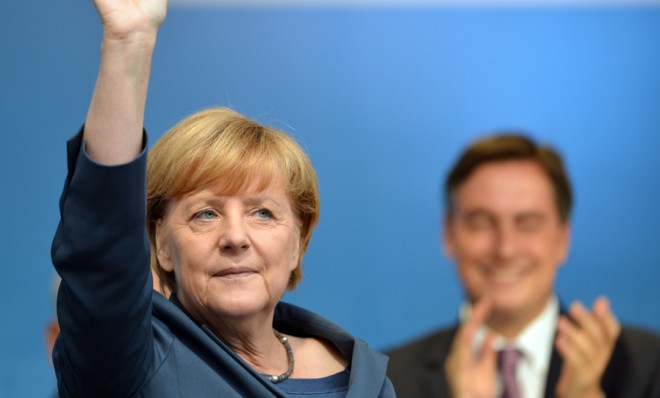What Angela Merkel's landslide win means for Europe
Germans really, really like their chancellor's "boring" approach to crisis management


A free daily email with the biggest news stories of the day – and the best features from TheWeek.com
You are now subscribed
Your newsletter sign-up was successful
German Chancellor Angela Merkel won a third term on Sunday with a decisive victory in an election widely seen as a thundering endorsement of her cautious leadership during the eurozone's debt crisis.
Merkel's center-right Christian Democrats did even better than their own polls projected, winning 42 percent of the vote in the party's strongest showing in more than two decades. But her old coalition partner, the pro-market Free Democrats, failed to win enough votes to get seats in parliament, leaving Merkel just short of becoming the first leader since 1957 to win an absolute majority.
The vote gave Merkel a clear mandate, "putting Europe's destiny more squarely than ever in her hands," says Sara Miller Llana at The Christian Science Monitor. The question is, what will Merkel do with her newly reinforced power?
The Week
Escape your echo chamber. Get the facts behind the news, plus analysis from multiple perspectives.

Sign up for The Week's Free Newsletters
From our morning news briefing to a weekly Good News Newsletter, get the best of The Week delivered directly to your inbox.
From our morning news briefing to a weekly Good News Newsletter, get the best of The Week delivered directly to your inbox.
Anyone expecting immediate changes might be disappointed, Llana says, because Merkel will now have to forge a new coalition, most likely with the center-left Social Democrats, or possibly the Greens. That could take months. And all the waiting will likely lead to a new team pushing the same policies as the old one, Llana says, because, "Ultimately Merkel won such a clear mandate because Germans like her slow and hesitant approach on Europe."
The Social Democrats would make a natural partner. In the past three years, notes Alison Smale at The New York Times, they "have given crucial support to Merkel in Parliament in passing credit lines and aid packages, tied to painful reforms, for eurozone countries in need." Merkel needs their help, but the Social Democrats "would clearly be a junior partner," Smale says, so they "are likely to extract a high price in domestic reforms — a minimum wage, or social change — in exchange for joining a Merkel government."
Merkel has won over the German public by insulating the country from Europe's troubles, steering Germany to its lowest unemployment in two decades while weaker nations around the continent imploded. She has resisted simply sending her nation's riches south, backing bailouts only after Greece and other debt-burdened nations imposed austerity measures and other reforms to fix their finances.
"Some are asking whether the 'real' Angela Merkel will now emerge," says Gavin Hewitt at BBC News. Well, don't hold your breath, he says, because her cautious instincts won't change. What does that mean for Europe? Here's The Christian Science Monitor's Sara Miller Llana again:
A free daily email with the biggest news stories of the day – and the best features from TheWeek.com
On Europe, that means further caution on the part of Berlin, which will likely continue to follow Merkel's "step by step" approach to dealing with the eurocrisis, demanding that ailing economies of the south undergo deficit cutting and economic reform in return for being "bailed out."That also means Germany will continue to move slowly on the next big reform in Brussels, a banking union, and perhaps even more slowly now with signs of EU weariness appearing throughout Germany. [Christian Science Monitor]
In short, says Wolfgang Munchau at the Financial Times, Germans want "a broad-based coalition with a non-visionary leader" because they don't like big, bold changes. The trouble is, Munchau says, big changes will be required to resolve Europe's crisis once and for all, but Merkel has been given a mandate to avoid them.
Germans, basking in their prosperity, seem to like having a "boring leader," says Jan-Werner Muller at Foreign Affairs, so that's what they'll get. "And given the turmoil in neighboring countries, it might seem churlish to begrudge Germany its devotion to consensus and its commitment, when all is said and done, to quietly keep the EU together at any price." The trouble is, Germans have made it clear that they don't want to dig deep and make major sacrifices to save the euro, Muller says, but some day they might have to.
Harold Maass is a contributing editor at The Week. He has been writing for The Week since the 2001 debut of the U.S. print edition and served as editor of TheWeek.com when it launched in 2008. Harold started his career as a newspaper reporter in South Florida and Haiti. He has previously worked for a variety of news outlets, including The Miami Herald, ABC News and Fox News, and for several years wrote a daily roundup of financial news for The Week and Yahoo Finance.
